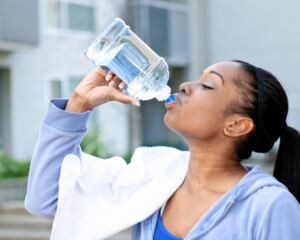Can You Drink Too Much Water?
We hear messages about drinking more water for better health all the time. Influencers promote water as the be-all and end-all of clear skin, weight loss, mental health, and digestive health.
Since water is calorie-free, some people believe that you can never have too much.
However, more is not always better when it comes to water intake. In fact, drinking too much water can be deadly, although this is very uncommon.
How much water is too much? What are the signs of water intoxication? We will answer these and more questions below.

How Much Water Should You Drink?
Proper hydration is important for your health, from blood pressure management to good digestion. Despite the many people who promote 8 cups of water a day, your individual water needs will vary depending on many factors, such as age, sex, weather, physical activity, and health conditions.
The Dietary Reference Intakes for total water intake for those 19-70 years are 3.7 L for men and 2.7 L for women. Total water includes both that from food and water, so the water content of soups, fruits, and vegetables all count. However, you should consume about 3 L of beverages for men and 2.2 L of beverages for women.
A general rule of thumb is to consume 1-1.5 mL of water per kilocalorie consumed. If you consume 2,000 kcal per day, then you should consume about 2-3 L of water per day.
Those who are pregnant or breastfeeding will need to drink more water. Although it depends on your weight and any health issues, people should generally increase their water intake by 300 mL during pregnancy.
How Much Water Is Too Much?
There is no one amount of water that is considered too much for everyone. If you have certain underlying health conditions (e.g., kidney problems), you may be more susceptible to water intoxication.
A person with healthy kidneys can excrete about 20-28 L of water a day to compensate for excess water intake. However, the kidneys can only excrete about 1 L of water per hour.
Therefore, drinking lots of water in a short period of time may cause overhydration or water intoxication.
What Happens When You Drink Too Much Water?
The body is constantly seeking out internal stability, called homeostasis. One important aspect of that is the concentration of electrolytes in the blood.
Electrolytes are minerals that have an electric charge (either positive or negative). Electrolytes are important for maintaining a healthy pH, muscle function, and hydration.
Important electrolytes include calcium, chloride, potassium, magnesium, and sodium.
Consuming too much water can disrupt the concentration and ratio of electrolytes in the body. One of the main concerns of overhydration is that it will dilute the amount of sodium in the blood, called hyponatremia. When hyponatremia becomes severe it can lead to water intoxication.
Overhydration, hyponatremia, and water intoxication are all different but related. Overhydration refers to excess water in the body, while water intoxication refers to a disruption in proper brain function due to excess water consumption. However, the effects of water intoxication are due, at least in part, to hyponatremia.
What Are the Symptoms of Water Intoxication?
At first, drinking too much water can cause nausea and bloating. If sodium levels drop suddenly due to an influx of water without electrolytes, it can cause severe symptoms.
Some symptoms of water intoxication include:
- Vomiting
- Headache
- Confusion
- Weakness
- Fatigue
- Unstable walk
- Convulsions
- Irritability
The lack of sodium can cause the brain to swell to a dangerous degree. In fact, water intoxication can cause coma or death if not treated.
Although it is rare to die from water intoxication, it can definitely happen. There are several cases of people dying as a result of drinking too much water during endurance sports or water-drinking competitions.
If you believe you or someone you know is suffering from water intoxication, seek emergency medical care immediately.
How Can You Avoid Water Intoxication?
You can avoid water intoxication by keeping note of your water intake and any early signs of overhydration. If you are drinking much more than the recommended amount or if you are drinking despite not being thirsty, you may be susceptible to overhydration.
As well, if you have clear, colourless urine, it is a good idea to cut back on your water intake. Aim for urine that is light yellow in colour (think lemonade).
If you do endurance sports, choosing sports drinks with electrolytes may be a good option. Avoid chugging large amounts of water during and after exercise. When you sweat you lose both sodium and water, so drinking too much water to replace the fluid lost can cause hyponatremia.
If you have liver or kidney problems, talk to your doctor about how much water you should be consuming each day.
Takeaway
Drinking enough water is beneficial for your health. However, you can drink too much water, and in extreme cases, drinking too much water can be deadly.
Aim to drink about 3 L of beverages per day for adult men and 2.2 L per day for adult women. Your individual water needs will vary depending on your age, activity level, health issues, and whether you are pregnant or breastfeeding.
If you think that you or someone you know is suffering from water toxicity, seek emergency medical treatment.

Leave A Comment